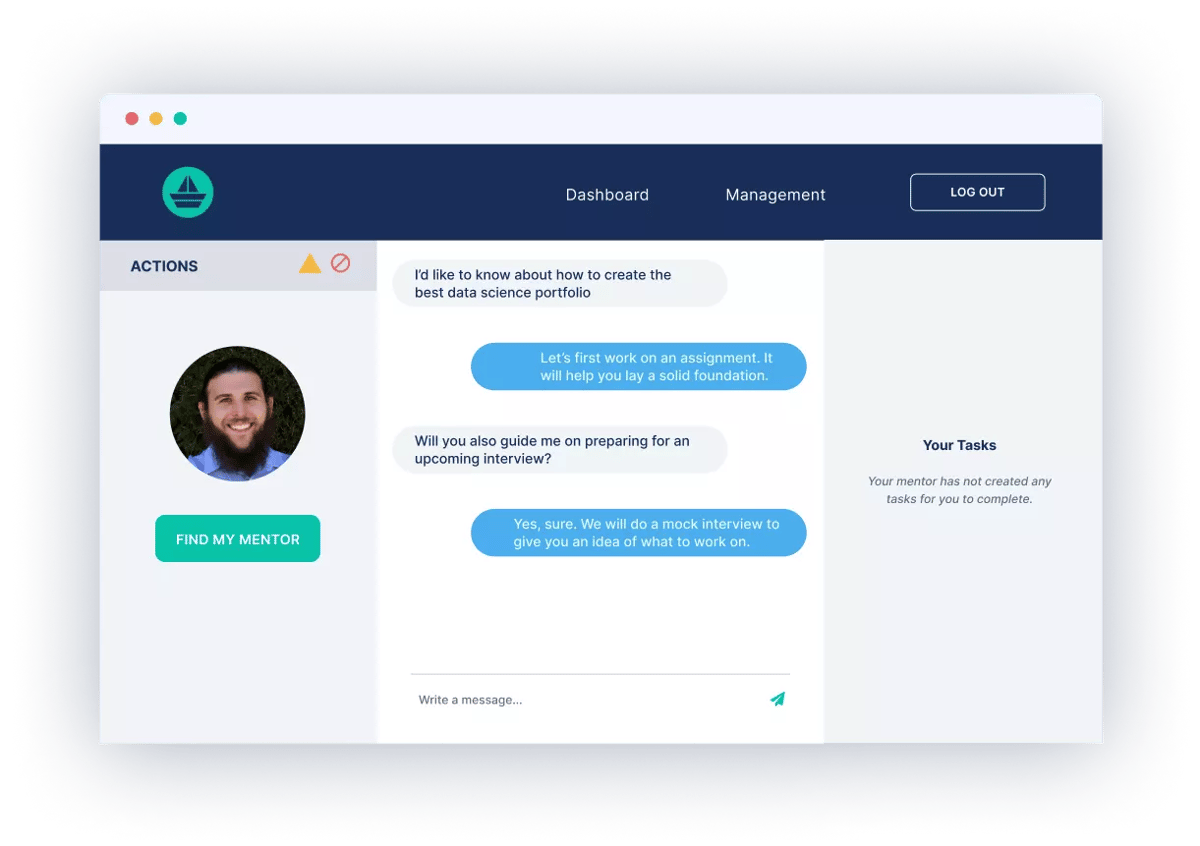Helpful summary
- Overview: We guide you on effectively mentoring your replacement, ensuring a smooth transition and their success.
- Why you can trust us: We've helped individuals and businesses expand their professional skills and opportunities with our mentorship platform. Success stories like Giuseppe Santoro, show how we provide a platform that allows you to effectively train teams to get them to the next level.
- Why this is important: Effective mentorship is key to a seamless handoff and the professional growth of your replacement.
- Action points: We recommend assessing your skills, setting clear expectations, providing structured training, and gradually transitioning responsibilities to effectively mentor your replacement.
- Further research: Explore MentorCruise for personalized mentorship programs across various industries.
But, it can be tricky to balance wrapping things up yourself while bringing someone else up to speed. With some planning and open communication, you can effectively equip your mentees with what they need to carry on the work.
In this MentorCruise article, we’ll guide you through the tips and tricks for mentoring your replacement.
Let’s get started!
Why listen to us?
At MentorCruise, we understand the transformative power of mentorship firsthand. With a track record of success stories like Giuseppe Santoro, a Senior Software Engineer at Elasticsearch, our platform connects individuals with experienced mentors who are passionate about sharing their knowledge and expertise.
What is a work replacement?
A work replacement, also known as a successor or protégé, is the person who will take over your role and responsibilities when you leave your position.
Mentoring a replacement is one of the most important things you can do to ensure a smooth transition and the continued success of your team or department.
As a mentor, your job is to coach and guide your replacement so they are fully prepared to take the reins. This includes:
- Training them on all aspects of the job and sharing your knowledge and expertise.
- Introducing them to key stakeholders and helping them build rapport. Plus, you can train them how to conquer interview nerves when talking to the key people in your business.
- Giving them increasing levels of responsibility over time so they can gain confidence and you can evaluate their progress.
- Preparing them for challenges they may face in the role such as discussing possible obstacles, complications, or issues that could arise and how to address them.
- Ensuring they understand the organizational vision and values by explaining key priorities, goals, and company policies.
- Gradually transitioning your direct reports and workload to the replacement so they develop leadership experience.
A successful mentorship results in a replacement who is fully ready to perform in their new role. They will have mastered the necessary skills, built key relationships, and developed a leadership mindset – all while upholding the standards and values of the organization.

MentorCruise offers a unique platform for professional mentorship programs, providing professionals with an opportunity to share their expertise with a global community of mentees across various fields including technology, career development, business, and design.
As a mentor on MentorCruise, you gain access to a platform that values high-quality service, allowing you to impact individuals' careers and personal growth directly.
With our flexible mentoring packages, a commitment to vetting for quality, and a no-obligation trial period, it's an excellent way for professionals to give back, grow their network, and develop their coaching skills.
MentorCruise Mentor: Giuseppe Santoro

Giuseppe Santoro is a Senior Software Engineer in the Observability department at Elasticsearch, with over a decade of experience in the software engineering field.
As a mentor, Giuseppe prioritizes understanding the goals and motivations of his mentees to tailor a personalized mentorship journey. He provides guidance not only in technical skill development but also emotional and motivational support, recognizing the importance of holistic growth.
One of his favorite mentorship success stories involves mentoring a team of young engineers who have gone on to achieve success in top-tier companies.
Benefits of mentoring your replacement
Mentoring your replacement before leaving a position offers various benefits, such as:
- Valuable insights: Mentoring your replacement offers a unique opportunity to gain valuable insights into your work processes and practices. By explaining tasks and responsibilities to someone else, you're forced to articulate and clarify your methods, which can lead to new realizations and improvements.
- Builds confidence: Guiding and training someone to take over your role can significantly boost your confidence in your abilities. As you see your replacement grow and succeed under your mentorship, it reaffirms your expertise and competence in the role.
- Ensures a smooth handoff: Mentoring your replacement ensures a seamless transition when it's time for you to move on from your current role. By proactively transferring your knowledge and expertise, you mitigate the risk of disruptions or gaps in operations.
- Develop a lasting relationship: As you invest time and effort into your mentee’s development, you build trust and camaraderie, creating a supportive bond that can endure even after you've moved on.
How to mentor your replacement
Here are some tips for effective mentoring:
1. Assess your replacement’s background and skills
Begin by understanding your replacement's background, skills, and experience. Assess their strengths, weaknesses, and areas for development to tailor your mentoring approach accordingly.
Here are the steps you should take:
- Schedule a meeting: Initiate a meeting with your replacement to discuss their background, skills, and experience. Use this opportunity to get to know them on a personal level and understand their career journey thus far.
- Review their resume and portfolio: Take the time to review your replacement's resume, portfolio, or any relevant documentation they provide. Pay attention to their educational background, work experience, and any notable projects or achievements.
- Conduct a skills assessment: Evaluate your replacement's technical and soft skills to identify their areas of proficiency and areas needing improvement.
2. Clarify expectations and objectives
Make sure to communicate the expectations and objectives of the role to your replacement. This involves discussing key responsibilities, goals, and performance metrics to ensure they have a clear understanding of what success looks like in the position.
3. Create a structured training plan
To effectively mentor your replacement, it's essential to develop a structured training plan that delineates the topics, skills, and knowledge areas they need to master. By breaking down the training into manageable modules or sessions, you can facilitate effective learning and progression.
This approach allows your replacement to focus on mastering one concept or skill at a time, ensuring they build a strong foundation before moving on to more complex topics.
Additionally, be mindful of your replacement's learning style and preferences when structuring the training plan, adapting it as needed to suit their needs.
4. Provide hands-on training and shadowing opportunities
Through hands-on training, your replacement can actively engage with the material, apply theoretical knowledge to real-world situations, and develop essential skills through practice.
Shadowing opportunities provide an invaluable chance for your replacement to observe you in action and learn from your expertise. By allowing them to accompany you in various work settings, they can gain firsthand insight into the nuances of the role and the intricacies of day-to-day operations.
5. Delegate responsibility gradually
Gradually delegate levels of responsibility to your replacement as they gain proficiency and confidence in the role. Provide opportunities for them to take ownership of projects, make decisions, and lead initiatives under your guidance and supervision.
6. Transition responsibilities smoothly
As your replacement gets better at their job and feels more sure of themselves, it's time to slowly give them more of your tasks. Do this in an organized way, making sure everything runs smoothly without any big interruptions. Start by figuring out which jobs your replacement can handle and when they're ready to take them on.
Set clear goals and deadlines for the transition, so everyone knows what's expected. Keep your replacement in the loop about the plan, and encourage them to ask questions and seek help when needed.
Best practices when mentoring your replacement
Here are some best practices to consider when mentoring your replacement:
- Start early and plan: Begin mentoring your replacement well in advance of your departure to allow sufficient time for them to learn and adapt to their new role. Develop a structured mentoring plan that outlines key objectives, milestones, and timelines for the transition process.
- Communicate openly and transparently: Maintain open and transparent communication with your replacement throughout the mentoring process. Communicate expectations, goals, and feedback to ensure mutual understanding and alignment and avoid the communication maze.
- Lead by example: Demonstrate professionalism, integrity, and a strong work ethic in your interactions with your replacement. Lead by example, showcasing best practices and behaviors that they can emulate in their new role.
- Provide constructive feedback: Offer constructive feedback to help your replacement identify areas for improvement and growth. Focus on specific behaviors or actions, and provide actionable suggestions for improvement.
- Create opportunities for growth: Create opportunities for your replacement to stretch their abilities and gain new experiences. Assign challenging projects, encourage participation in cross-functional teams, and support their pursuit of professional development opportunities.
- Celebrate achievements and milestones: Recognize and celebrate your replacement's achievements and milestones along the way. By acknowledging their progress and contributions, you’ll reinforce their confidence and motivation.
Conclusion
By imparting your knowledge, skills, and experiences to your replacement, you not only ensure a smooth transition but also contribute to their professional growth and development. Through effective mentorship, you empower your replacement to excel in their new role, fostering continuity, resilience, and long-term success within the organization.
With a wide network of experienced mentors across various industries and disciplines, MentorCruise provides personalized mentorship programs tailored to individual needs and goals.
Whether you're looking to mentor your replacement or seeking mentorship as a replacement yourself, MentorCruise connects you with skilled mentors who can offer valuable insights, advice, and support to navigate your professional journey with confidence and success.
Become a mentor today!







